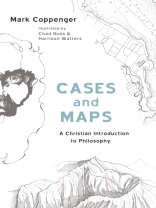A dying man hires the services of a cannibal; a customs official insults a world-class sculptor; a farmer complains that low-flying bombers are killing his chickens; two rock groups claim the same name; a monkey takes a selfie; and a minister with mail-order credentials performs a wedding. The resulting court cases (and sixteen others) serve to introduce a wide range of philosophical notions (such as libertarianism, speciesism, and speech acts).
Next, a subway employee draws a revolutionary map; a mountain loses its name; a strange cineplex puts people in each others’ movies; the art museums of Madrid loom over neighboring buildings; a nautical chart guides seamen into a Connecticut port; and Jerusalem stands 'due north’ of the Mediterranean. These maps (twenty-three in all), whether real or imaginary, introduce yet other philosophical notions (such as pragmatism, universals, and paradigms). Along the way in both sections, we meet a wide range of thinkers, from Plato to Aquinas to Hume to Kant to Searle.
The explanations and discussion questions are written from a Christian perspective, inviting believers to join in the perennial dialogue with the conviction that if you don’t have philosophical and theological positions sorted out, then they will have you.
O autorze
Mark Coppenger is Retired Professor of Christian Philosophy and Ethics at Southern Baptist Theological Seminary. He has a B.A. from Ouachita, a Ph.D. from Vanderbilt (both in philosophy), and an M.Div. from Southwestern. He’s taught full time at Wheaton, Midwestern, and Southern; been senior pastor for churches in Arkansas and Illinois; served as an infantry officer; and done short-term missionary stints on five continents.












